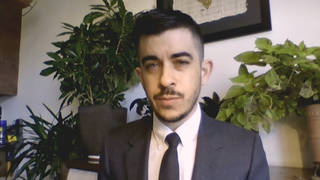
Related
We look at President Trump’s top pick for a woman to fill the Supreme Court seat left vacant by the death of the late Justice Ruth Bader Ginsburg: U.S. Court of Appeals Judge Amy Coney Barrett, who is a devout Catholic who has taken conservative stances on abortion, gun rights, immigration and LGBTQ rights. Barrett’s involvement with the conservative Catholic group People of Praise, whose members pledge a lifelong loyalty oath to the group, has also raised questions about her ability to rule independently. “There’s some real concerns about whether her involvement in there will affect her ability to be impartial and fair as a judge,” says Heidi Schlumpf, executive editor of the National Catholic Reporter.
Transcript
AMY GOODMAN: We begin today’s show looking at the future of the Supreme Court. On Tuesday, Utah Republican Senator Mitt Romney said he’ll support a floor vote for President Trump’s nominee to replace Justice Ruth Bader Ginsburg, who died last week at the age of 87.
SEN. MITT ROMNEY: My liberal friends have, over many decades, gotten very used to the idea of having a liberal court. And that’s not written in the stars.
AMY GOODMAN: The announcement means Majority Leader Mitch McConnell has the support of 51 Republican senators he needs to rapidly push forward with a vote on Justice Ginsburg’s replacement, just 41 days before the November election. In 2016, McConnell refused to hold confirmation hearings for Merrick Garland, President Obama’s nominee to replace Justice Antonin Scalia, who died nearly nine months before the election. At the time, McConnell said, quote, “The American people should have a voice in the selection of their next Supreme Court justice.”
President Trump has said he will name his nominee by Saturday and that it will be a woman. The front-runner appears to be U.S. Court of Appeals Judge Amy Coney Barrett, who met with Trump on Monday. Barrett is a devout Catholic who’s taken conservative stances on abortion, gun rights and immigration. The Human Rights Campaign has called her a, quote, “absolute threat to LGBTQ rights,” unquote.
One issue that’s likely to be raised if Judge Barrett is nominated to the Supreme Court is her membership in a secretive Catholic group called People of Praise. Members of the group pledge a lifelong loyalty oath to the group, which assigns each member a personal adviser known as “heads” for men and, until recently, “handmaids” for women. The secretive group has a strictly patriarchal structure in which men are the heads of household with power over their wives and families. The group has been described by some as “cult-like.”
The Senate did not question Barrett about People of Praise directly during her 2017 confirmation hearing for the U.S. Court of Appeals for the 7th Circuit. But California Democratic Senator Dianne Feinstein did question Barrett about her views on Roe v. Wade and her religious views.
SEN. DIANNE FEINSTEIN: Why is it that so many of us on this side have this very uncomfortable feeling that, you know, dogma and law are two different things? And I think whatever a religion is, it has its own dogma. The law is totally different. And I think, in your case, Professor, when you read your speeches, the conclusion one draws is that the dogma lives loudly within you. And that’s of concern when you come to big issues that large numbers of people have fought for for years in this country.
AMY CONEY BARRETT: I’m being considered for a position on a court of appeals, and there would be no opportunity to be a “no” vote on Roe. And as I said to the committee, I would faithfully apply all Supreme Court precedent.
AMY GOODMAN: This all comes as President Trump is scheduled to speak this morning at the National Catholic Prayer Breakfast.
Well, for more, we’re joined by Heidi Schlumpf. She’s the executive editor of the National Catholic Reporter. In 2018, she wrote the piece “Prospective Supreme Court nominee puts spotlight on People of Praise.” She’s joining us from Chicago.
Welcome to Democracy Now!, Heidi. Why don’t you start off by telling us a brief biography of Amy Coney Barrett and what People of Praise is?
HEIDI SCHLUMPF: Thank you, Amy, so much for having me. And I’m happy to talk to you this morning.
So, Amy Coney Barrett is, like your introduction said, a Catholic judge. She has also been a professor at the Law School at the University of Notre Dame. She is a conservative judge, an originalist, as we would probably expect to be at the top of the list of this president and leader in this party. I’ve seen some reporting that said she has been groomed for this moment since as early as her first year in law school by a group of faculty at the University of Notre Dame’s Law School who were strongly opposed to Roe v. Wade. So, she’s on the list from the Federalist Society, and we have a connection there to that National Catholic Prayer Breakfast that’s about to start later this morning. The founder of the National Catholic Prayer Breakfast, Leonard Leo, was also the longtime leader of the Federalist Society, which has for decades been trying to reshape the judiciary, especially around some of these culture warrior issues like abortion and LGBT rights.
So, one of the reasons that Amy Barrett was not questioned about her membership in this group within Catholicism called the People of Praise is that she did not disclose it on her questionnaire back in 2017. But when her name was floated to the top of a list when Justice Kennedy retired back in 2018, that’s when many people started asking questions about the People of Praise.
So, the People of Praise is a covenanted community, which means that its members sign a covenant or make a covenant to one another. And I just want to say at the beginning here that I don’t think there’s anything wrong with practicing your faith. I’m a Catholic. And I think many people join groups of other like-minded people. The level of commitment that you see in these covenanted communities is admirable. However, because of some of the secretness and some of the beliefs of a number of these communities, as well as some allegations by members who have left, of authoritarianism, there’s some real concerns about whether her involvement in there will affect her ability to be impartial and fair as a judge.
JUAN GONZÁLEZ: And, Heidi Schlumpf, could you talk about some of those alleged authoritarian practices? Some of the descriptions that I’ve heard, of this complete submission to the will of your husband, and the involvement of leaders of the group in the most intimate parts of a family’s functioning. Could you talk about some of those practices? And also, what is the response of the Catholic hierarchy to groups within the Catholic Church that, by all appearances, appear to be cults?
HEIDI SCHLUMPF: Yeah. So, I would say, just to take your second question first, that the charismatic movement in the Catholic Church, which goes back to like the 1970s, is something that is accepted by the Catholic Church, but not everyone who is a charismatic Catholic — “charismatic” referring to someone who has a personal experience of God, kind of directly through the Holy Spirit, and often results in different gifts of the Holy Spirit, like speaking in tongues or healing or prophecy. So, this whole idea of charismatic experience within Catholicism is something that the church is OK with.
A number of these covenanted communities are kind of a subgroup of charismatics. And there’s a number of these other communities, that we’ve reported on at NCROnline several times: Word of God, Sword of the Spirit, Lord’s Ranch, the Mother of God Community.
I looked specifically at the People of Praise, which, to be quite honest, has fewer criticisms than some of these other organizations. But what you have is a setup in which these members of the community — and there are about a little under 2,000 of them in the People of Praise, spread out over various number of cities — most of them are Catholic, but it is an ecumenical group. They belong to regular parishes and worship at their local church. But then, usually on Sunday afternoons, they get together for their own sort of prayer service, and then they also may meet in smaller groups throughout the week, single-gender groups.
But then you’re asking about this idea that they have a head or someone who is kind of like a spiritual adviser. And for a man, their spiritual adviser would be another man in the community. For a single woman, your spiritual adviser would be another woman. But within marriage, the wife’s spiritual adviser is her husband. And this whole language of “handmaiden,” which, of course, is scriptural, and obviously has a very negative connotation now because of the Margaret Atwood book and series, is something that sort of reinforces a patriarchy that not only this group but a number of evangelical Christians have, that see husbands as the head of the family and the decision makers, and, consequently, women in a more submissive or subordinate role.
So, there’s also founders of some of these groups, not so much as a problem with People of Praise, that have some history of being very authoritarian. The decisions that a head might discuss with their advisee, I guess, could be anything around where you should live, who you should marry, where your children should go to school. But a member that I interviewed who was a current member said it’s everything from those kinds of important decisions to, you know, redecorating their house. So, there’s nothing wrong, again, with somebody having a spiritual adviser, but the secrecy involved in this organization does raise some red flags, as do some of the reports from people who have left.
JUAN GONZÁLEZ: And who is the leadership of the People of Praise, given the fact that the members pledge loyalty to the group, and obviously the decisions of the leaders would have an influence, let’s say, in the case of Amy Barrett?
HEIDI SCHLUMPF: Yeah. So, the leader I spoke to back in 2018, who I believe is still the head, is Craig Lent. He is a professor at Notre Dame. And I will tell you, I know a number of folks in South Bend — I’m a Notre Dame grad myself — who know people who belong to the People of Praise, or I know people who send their children to the People of Praise’s schools. So, they have a number of private schools, including in South Bend. And what I hear from them is they’re perfectly nice people and very — you know, very normal.
That said, because there is a level of secrecy — for example, I tried very hard to get a copy of the covenant, which I understand is a few sentences that the covenanted members make to one another, and they were very reluctant to have that be public in any way. So, those kinds of secrecy things, I think, are what bring people to use language about like cults. I’m not sure that I would call it a cult, but I would say that some of those concerns about authoritarianism, secrecy — it is true, I heard from a number of other members that I spoke with or chat rooms where I read what they were saying, is that when they were trying to leave the organization, there was a level of shunning of them, as well.
AMY GOODMAN: I wanted to ask you about this pledging of lifelong loyalty to the group, which assigns each member a personal adviser, known as “heads” for men and, until recently, “handmaids” for women. The secretive group has a strictly patriarchal structure in which men are the heads of the household, as you said, with power over their wives and families. The group has been described by some as “cult-like.”
And Margaret Atwood has talked about various Catholic charismatic groups. The group she based Handmaid’s Tale on was People of Hope in New Jersey, not the South Bend People of Praise. But, of course, that term is so significant, that they used “handmaids” tale [sic] until recently. Atwood told The New York Times, “I delayed writing it for about three years after I got the idea because I felt it was too crazy. Then … I started noticing that a lot of the things I thought I was more or less making up were now happening, and indeed more of them have happened since the publication of the book. There is a sect now, a Catholic charismatic spinoff sect, which calls the women handmaids. They don’t go in for polygamy of this kind but they do threaten the handmaids according to the biblical verse I use in the book — sit down and shut up,” she said. Now, again, that’s a different charismatic Catholic group, a kind of spinoff, People of Hope. Explain the difference.
And also, if you could respond to — I mean, the unfortunate questioning of Feinstein when she said to Amy Barrett, “The dogma lives loudly within you,” was then, you know, people took great umbrage at that. And she said, “I can separate my religious views from my legal opinions.” “The dogma lives loudly within you” was Feinstein’s comment. And if you can talk about that and whether that will prevent people from questioning Amy Coney Barrett about her views and how they affect her legal decisions?
HEIDI SCHLUMPF: Well, just to go back to the People of Hope, so, the People of Hope, I’m less familiar with — excuse me — but I would say that I have followed a number of folks who grew up in some of these covenanted communities, and there is a history of allegations, especially by folks who have chosen to leave it, of problematic authoritarianism.
I think there’s — it’s interesting to note that, historically, there’s nothing inherently conservative about the charismatic movement. So, if you’re having this personal relationship with the Holy Spirit and with God, God could also, you know, tell you to be a progressive Catholic, I suppose, too. But many charismatic movements have aligned themselves or are very similar to Pentecostalism and Protestantism, and so we have this sort of combining of conservative Catholicism, with all of its teachings around gender roles, anti-gay marriage and these sorts of things, that then get sort of connected with these charismatic groups.
So, I think what — many people’s concern isn’t that she’s the member of a religious community. Obviously, you know, this is not simple anti-Catholicism. If being a Catholic was a problem for being on the Supreme Court, why do we have so many Catholic justices already? But it’s this particular group, its secretiveness. And then also it does have — and she has specifically spoken about her own views on abortion, on even the death penalty, in terms of church teaching on that, on gay marriage. I do think it’s somewhat ironic that if —
AMY GOODMAN: Opposed to all.
HEIDI SCHLUMPF: Yeah, opposed to the death penalty, yes, opposed to abortion, opposed to gay marriage. And so —
JUAN GONZÁLEZ: I —
HEIDI SCHLUMPF: I do think — go ahead.
JUAN GONZÁLEZ: I wanted to ask you, given the fact that one of the apparent principles of People of Praise is that a wife must be submissive to the will of her husband, and that in this case Amy Barrett’s husband is a member of the group, as well, what does this say about her ability to make independent decisions, apart from what her husband might think, when she’s on the court?
HEIDI SCHLUMPF: Yeah. So, I can’t speak to that specifically, although, you know, it’s possible that there could be somebody nominated to the court who has that belief and it’s not known in a public way, because of — her membership in this group, it’s known. And I think that is a fair question for her, if she were to be nominated and at a confirmation hearing. So, obviously, when the Senate is looking to confirm someone to such an important position, a lifelong position, I think all kinds of questions about someone’s beliefs, including their religious beliefs and their membership in certain organizations, is fair game.
Now, I think the Democrats are going to be in a tough position, as it’s increasingly looking like this hearing could be happening before the election. So they have to be careful not to be appearing to ask her questions that are perceived by some as insulting her or anti-Catholic, insulting her religion. Obviously, Joe Biden and the Democrats have done a lot to reach out to religious voters, moderate religious voters, during the campaign and wouldn’t want to undo all that. I know there are conservative Catholics who proudly say, “The dogma lives in me,” to what Dianne Feinstein said.
The only thing I can say is that it must be that Amy Barrett’s husband wants her to be on the Supreme Court, because — it is somewhat ironic, you know, if that’s what he’s encouraging her to do, because it is somewhat ironic that in a group that believes in the submission of women, we have a woman from that group who is potentially going to be on the highest court in the land.
AMY GOODMAN: Before we go to a former member of People of Praise, I wanted to go to Amy Coney Barrett’s views on the ACA — extremely relevant. In a 2017 law review, she criticized Chief Justice John Roberts for voting to uphold the Affordable Care Act in 2013. She wrote, quote, “Chief Justice Roberts pushed the Affordable Care Act beyond its plausible meaning to save the statute. He construed the penalty imposed on those without health insurance as a tax, which permitted him to sustain the statute as a valid exercise of the taxing power; had he treated the payment as the statute did—as a penalty—he would have had to invalidate the statute as lying beyond Congress’s commerce power.” It’s a little hard to understand, but it’s extremely significant, because if Amy Coney Barrett was nominated, confirmed and sat on the court before November 10th, those are the date of the oral arguments on the ACA, which could strike the whole thing down. Heidi, your final comments on this?
HEIDI SCHLUMPF: Yeah. So, I do think that she is a conservative judge, and she is a conservative Catholic. And the Catholic Church in the United States has long supported the Affordable Care Act, especially after the accommodations were made for Catholic employers that didn’t want to provide contraceptive coverage. So, it will be interesting to see if she sides with church leaders on that one or not.
She has said that she would not have her faith affect her decisions as a judge. She had written a law review article once saying that judges would have to recuse themselves, for example, from capital punishment cases. She does at least have consistency on that pro-life issue, the capital punishment and abortion. But if she does get confirmed, it would be very interesting to see what she does. She may surprise us. Sometimes judges do very different things than we expect from them.
AMY GOODMAN: Heidi Schlumpf, we want to thank you so much for being with us, executive editor of the National Catholic Reporter. In 2018, she wrote the piece “Prospective Supreme Court nominee puts spotlight on People of Praise.”
When we come back, we’ll be joined by a former member of the group who likens People of Praise to a cult. Stay with us.












Media Options